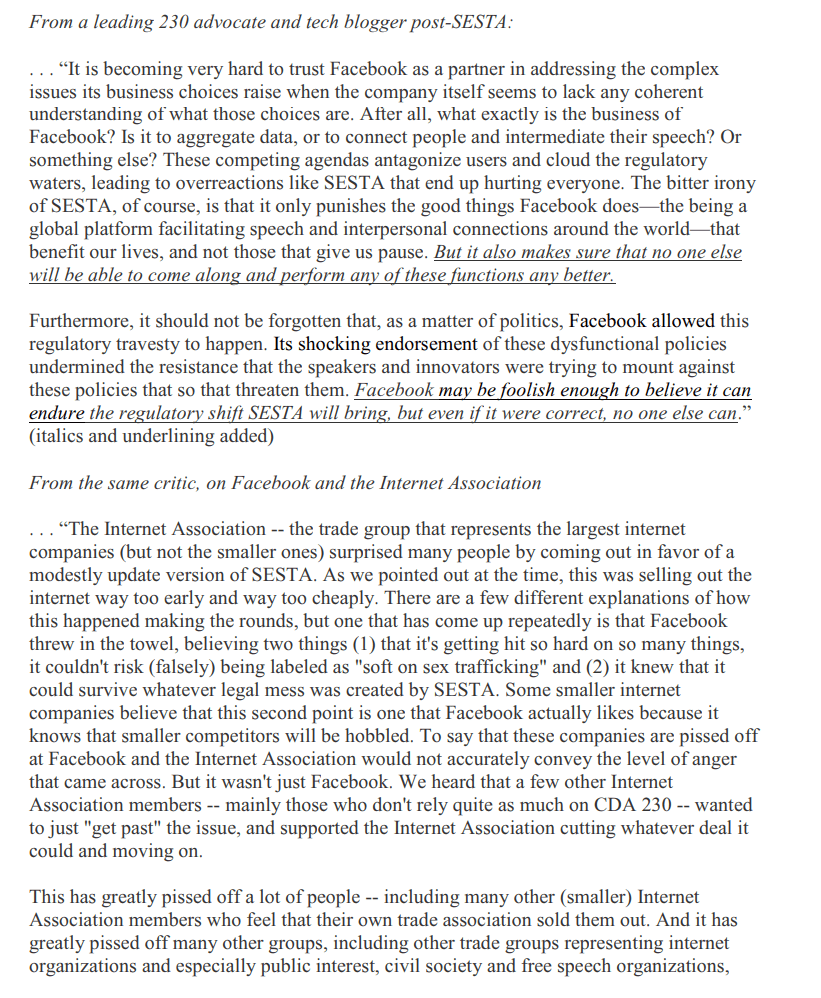from the cracking-down-on-the-internet dept
During the last year of the Trump administration, there was this weird period where the Bill Barr DOJ decided that it could destroy the internet. It came out of Donald Trump declaring that Section 230 was bad for whatever reason Donald Trump thinks anything is bad, and telling his Attorney General to do something about it. This kicked off a weird time where Bill Barr was suddenly criticizing 230 (even though 230 has nothing to do with the DOJ) and ran a silly process to come up with “ideas” for how to change 230 (again, totally outside of the DOJ’s authority).
In 2020 (before COVID took over everything), the DOJ held a very odd “workshop” in which it brought in every crazy MAGA kook with a conspiracy theory about the internet to tell them how to rewrite 230. It then proposed some very bad ideas for how to “reform” 230, before effectively the clock ran out on Trump’s first term.
The good folks at EFF filed multiple lawsuits over all this, and earlier this year discovered that one reason why the clock ran out on the DOJ was that the team working on these issues was blindsided when, in the middle of it all, Trump issued an executive order that attacked the internet companies he was mad at… which the DOJ was already trying to figure out a way to regulate via 230 reform.
EFF has now received some more FOIA files from the government, and found that the Bill Barr DOJ was actually working closely with Congress to try to get a 230 rewrite through.
The new documents, disclosed in an EFF Freedom of Information Act (FOIA) lawsuit, show officials were talking with Senate staffers working to pass speech- and privacy-chilling bills like the EARN IT Act and PACT Act (neither became law). DOJ officials also communicated with an organization that sought to condition Section 230’s legal protections on websites using age-verification systems if they hosted sexual content.
It’s certainly not unheard of that the DOJ would communicate with Congress over changes to laws it would like to see, but this still remained pretty weird in that usually it’s over laws that impact the DOJ itself (i.e., federal criminal laws). Remember: Section 230 has always had a carve out for all federal criminal laws, so does absolutely nothing to hinder any DOJ case whatsoever.
Many of the emails involve Lauren Willard, who worked directly for Bill Barr at the DOJ, in charge of competition and tech issues, and was part of the team that brought the DOJ’s first antitrust lawsuit against Google. In this packet is the email she sent to a bunch of Senate staffers who were apparently a part of the wider team between DOJ and certain Senate offices to gut 230:
Hi everyone,
After many, many months of hard work and collaboration by this group, we finally received the green light to send our draft legislative packet to OMB to start the interagency process. (Yay!) Attached is the draft redline, cover letter, and section by section. There were a few minor edits as this was officially cleared by DOJ Leadership, but is extremely close to what everyone has seen numerous times already.
I really appreciate this team’s intellect, patience, and creative thinking. I know the draft isn’t exactly what everyone wanted, but I think it is a credible and thoughtful contribution to the Section 230 debate and represents well our DOJ equities.
Also, the fact that the DOJ was coordinating with people like Jon Schweppe (the last link in that EFF summary) is doubly interesting given that he’s now at the FTC and one of his tweets about punishing Media Matters helped get the FTC’s bogus investigation of that org blocked by the court. His contribution was to try to get Section 230 contingent on age gating the internet:
APP’s primary policy goal with regard to pornography is to get sites that host pornography to implement an age screening system. We think the best way to do this (while adhering to SCOTUS precedent) is to get the sites to do it voluntarily by having Congress amend Sec. 230 and make their immunity from civil liability conditional. There are a couple ways we can do that, but it sounds like DOJ’s proposal might effectively do the same thing?
Also of interest: in the latest packet… the DOJ was apparently reading Techdirt! On page 431 there’s a document (it’s unclear what it was for or how it was used) apparently looking at the reaction to FOSTA (the one time that Section 230 has been amended). The document includes the Sheryl Sandberg blog post where she flips Facebook from working to stop FOSTA to coming out in full-throated support. It then quotes the NY Times, but then quotes “From a leading 230 advocate and tech blogger post-SESTA,” and includes quotes from two different Techdirt articles. First, an article Cathy Gellis wrote blaming Facebook’s change of heart for ruining the internet for everyone. And then my postmortem on how the Internet Association was pressured by Facebook to support FOSTA, and how many of its other members were pissed off about this (leading to the eventual dissolution of the entire organization).
The DOJ files quote both of those articles without saying who wrote them or the URL (though it implies both were written by the same person, despite Cathy and I being very different people—does no one read bylines any more?). At least they consider us a “leading” 230 advocate…

Anyway, a good bit of FOIA sleuthing by EFF, showing that a non-independent DOJ carrying out orders from Donald Trump to punish his perceived enemies, even outside the DOJ’s purview, was also a thing back during his first term.
Filed Under: bill barr, doj, intermediary liability, section 230
Companies: eff











